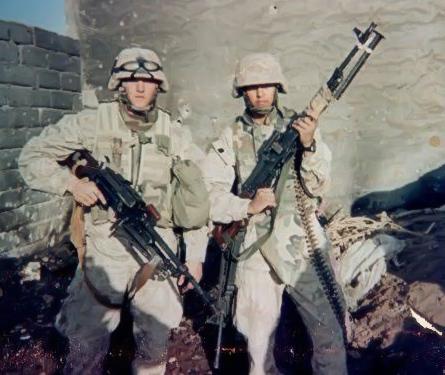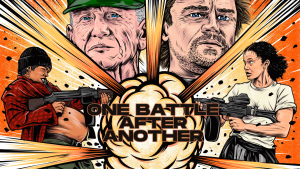Navajo veteran reflects on contribution in Marine Corps Modern day warrior
Veteran spotlight

November 27, 2015
Coming from a broken home in the small town of Grants, New Mexico, Navajo Marjon Pino overcame violence, poverty and alcoholism from his childhood and found a new meaning to life through his military career.
In December 2003, Pino left home and joined the United States Marine Corps at the age of 19.
While enlisted, Pino was stationed at Camp Pendleton and was sent on deployment in 2004, 2005 and 2006.
“This month [November] was [the time of] my first deployment when we deployed to Fallujah, when we invaded them. So the holidays and this time is not the best for me, I kind of get depressed and have withdrawals and for that reason I look at it differently.”
“It was probably my first deployment where I was sent straight into a combat situation; it was eye opening for me at 19,” said Pino.
He describes his first deployment as being a game changer in his life, thanks to the realness and appreciation it exposed him to.
“Going through Fallujah at a young age, we were the first major offensive in the city since Hue City, so it’s kind of part of history, but at the same time I was thrown into it. I trained, graduated boot camp, went to another training and I was pushed straight into it.”
“You know what you see on video games, television and movies… the craziness of war? It was what I actually saw. It made me more thankful and grateful for everything around me and [I] always know that people I [knew] actually gave their life for us—for me to be here,” he said.
He said his decision to join the military was his best as he deems it a pivotal moment that mended his roots.
“I came from a broken home. A lot of issues stem from my childhood: poverty, violence, alcohol. When I joined the military, it settled down a lot of my family members. It brought my family together. We are a lot closer because of that now; we are a family now. It showed how important we are to one another and how we shouldn’t be fighting with each other” said Pino.
Growing up, Pino said his father’s side of the family was raised Christian and his mother’s side was more traditional, and due to the imbalance in the household, it caused him to ask questions. But in the end, he was only shut down.
“There were mixed signals and I didn’t know what to believe so I shied away from it. But as I got older, I balanced them both because I do respect parts of Christianity, but I am also deeply trying to learn and understand my traditional side,” said Pino.
In regards to being Navajo and a veteran, Pino sees both as something he is greatly proud of accomplishing at a young age as his tribe had a huge impact on military history.
“The Navajo code talkers helped in WWII against the Japanese. They couldn’t break our codes. It is unique because Navajos before me, who were code talkers, were given direct orders and they couldn’t talk about it, but a couple years back they were rewarded for their courageous acts,” he said.
“It feels good to be able to say I served in the military because it makes me feel like I’m apart of that—the warrior class. It’s not the warriors you see in the movies, but our veterans are modern day warriors and they are respected… When people thank me for my service, it makes me feel like I’m one of those big T.V. warriors.”






